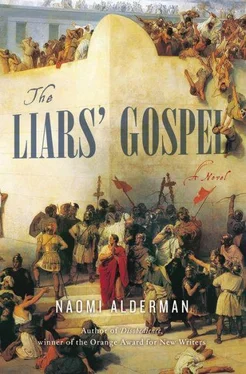The bars pop free one after another. Isaac squeezes through the gap, scraping his arm on a protruding tongue of metal. Ariel and Joseph follow him, then the others, carrying their swords now openly in their hands. They walk towards the guards’ gatehouse. No one could see them if they looked out of that window, the rain is driving too hard and the night is too dark. They might see a shadow moving, but it could as well be a barred cloud moving across the face of the moon.
They stand by the door of the gatehouse. Inside it is warm and dry. Isaac boldly places his ear to the door. If someone inside opened it now, they would have his head off before any of the others could stop it. But no one opens the door. Isaac listens for a moment and holds up three fingers. Three guards.
They burst in, swords drawn, shouting with the raging voice of the storm that batters on the Temple. They slay one man before he has even been able to look around, a sword digging down into his neck from the top of his shoulder and dragged out again, leaving his head toppled at an awkward angle. The other two throw down their mugs and draw weapons to fight, but the numbers are too great.
One of them is a boy not much older than Yochim. He fights like a demon, whirling his arms and screaming and yelling. It is Isaac, the leader of the band, who steps in and cuts him with an upward thrust as his arms are raised, coming in through the armpit and slicing into the chest. The other man, older, in his fifties with a beard of pepper and salt, fights well and honorably. He backs himself into a corner of the room when he sees the numbers, forcing them to come at him one at a time. He manages to take an arm off one of the Edomeans — Haron — before they bring him down, bubbling blood from his mouth, falling to his knees and then onto his face.
There are more deaths. Six guards in the inner gatehouse. A dozen priests asleep in their beds — they surround them in the dormitory with raised swords and bring the blades down at the same moment so that all twelve die without waking. A man returning in the night from the privy dies with his head half in a dream he’d had of a woman — not his wife — bearing a garland of flowers. They give him a red necklace before he even knows who they are.
When they have taken the inner courtyard, they send for their eminent leaders — the men who are too old now to fight but will wish to see the glorious victory. They slit the throats of two guards posted at the door to the High Priest’s house in the Temple when one of the men goes to take a piss and the other comes to see where he went.
They think that the High Priest will have escaped into the Temple building. But he is waiting there in the upper chamber of his small house. Perhaps he did not think it could come to this. Or perhaps, like his father, he believes so strongly in the power of the office that he knows no harm will come to him. Who would hurt the High Priest? And perhaps he can still reason with them. Perhaps it is not too late for peace.
It is then that Bar-Avo comes, a warm fur robe around him and four strong men by his side. They have saved this for him. He is an old man, but still commands the respect he did in the prime of his life — Av-Raham taught him how to do that. He comes wrapped in layers of warm clothes and with one of his men holding a hood above his head to keep him dry.
As they cross the threshold of the Temple, through the gates that are now thrown open, Bar-Avo finds himself thinking again of that man who was crucified in his place by Pilate, half a lifetime ago. Of how certain he was that the world was coming to an end, and how perhaps it is coming to an end, perhaps it has always been his place to make it come to pass.
They enter the chamber of Ananus. He has been the son most like his father, the one most fit to take Annas’s mantle as far as the business of accommodating Rome goes. He has tried to keep this worthless peace, he has apologized for Rome and made excuses for her. He has made the daily sacrifices to Rome in the holy Temple. Bar-Avo has already had his elder brother Jonathan killed. Ananus does not know Bar-Avo’s name, but he knows whom to fear.
When he sees who is there, his body tenses. He begins to shake. His lips become pale. He tries to call out for the guards, then stops himself, saying, “No, no, they’re dead already, aren’t they? Dead, for you have killed them, haven’t you? Yes, I know you have.”
Bar-Avo hits him across the face. It is not a hard blow. But no one has struck the High Priest in quite some time, probably since he was a little boy. He turns very white. Does he begin to understand now the seriousness of his situation?
“What do you want?” says Ananus.
Bar-Avo smiles. “Just to talk, High Priest. For now, only to talk.”
“I have nothing to say to a man like you.”
Bar-Avo strikes him again. It is like a game between them. Bar-Avo’s composure does not alter as he hits the High Priest, or as he sits back in his chair and says, “Very well, then. I shall say a few things to you.”
He reminds himself suddenly of another interview, where he was the one standing, and his interlocutor was sitting just so, composed, behind a desk. Is he Pilate now? Is any man with enough swords at his disposal Pilate?
They have the usual dance.
Bar-Avo requests information about the strongholds of the city, about the weapons in the Temple. Ananus refuses to answer.
Bar-Avo flatters, suggesting that the High Priest has a great deal of influence with the people and that a speech from him could convince them to fight against the Romans.
“If every man in this nation took up swords against them,” says Bar-Avo, “they could not stand against us. United, we cannot be defeated.”
“You will kill us all like this,” says Ananus. “You and your fucking faction, you and your army of ten thousand men — don’t you know there are fifty thousand who serve the Temple? Don’t you think they’re more important than you? Them alone. Not even beginning to count all the others.”
“Traitors,” says Bar-Avo, “collaborators. Rome would control Jerusalem for ten thousand years if they had their way. The land must be free. The people thirst for freedom!”
“The people don’t care!” Ananus is shouting now. “They support you because you bring them bread and water and willow bark for their fevers.”
“It’s more than you do.”
Ananus inclines his head, a little.
“We distribute bread also. And we give them a place to talk with the Lord. Most people…listen, ordinary people”—and Ananus has never sounded more patrician than now—“out of a thousand men, do you know what nine hundred and ninety want? A good price for their crops, a good husband for their daughter, good rain in its season and good sun in its time. They don’t care who rules. They don’t care about who controls holy Jerusalem as long as they can still go to their Temple and worship in peace. Most people want us to find a way to live peacefully with Rome.”
“Rome who slaughtered their sons? Rome who raped their daughters?”
“Even so. There will be more daughters and more sons, thank God. And shall they also be sacrificed to fight an unwinnable war?”
“We shall win,” says Bar-Avo, “for God is with us.”
Ananus shakes his head. He is so old now, though his eyes are still sharp and his mind is not clouded. Once he had been as tall and as strong as his father. The best of the brothers, people said, the best of the five of them, with those muscles in his shoulders like hard knots of old rope. But the power in his mind is not in his body now. He could not fight these men off.
“God is with the victor,” he says, “that is all God has ever done. Listen”—he places his hand palm down on the table, as if he concealed a trick underneath it—“it is not too late to make your peace. People remember my father. The men who were his friends are my friends now. I have a great deal of influence. I could speak on your behalf. Perhaps some arrangement can even be brokered. Your forces are strongest in the east, are they not? Perhaps we can make an agreement with the Roman captains in the east to give you some control of that region—”
Читать дальше












